News for 16 February 2021
All the news for Tuesday 16 February 2021
Campo strengthen place at top of both Spanish leagues
Club de Campo have the clear lead in both the women’s and men’s Spanish leagues after outdoor competition returned after the winter break.
The women swept by the challenge of Atlètic Terrassa 3-0 with Candela Mejías and Sara Barrios both scoring inside the first six minutes before Begoña García netted two minutes into the second half with an accurate shot.
The victory leaves them six points clear of Junior FC – who have a game in hand – after the Sant Cugat side won 2-1 at home against UD Taburiente.
That duo are well clear of the rest with Complutense SPV in third, 10 points back from Campo, following a 2-0 win on Sunday against Club Egara.
In the men’s competition, Campo have a three point lead over Club Egara with EHL-bound Atlètic Terrassa in third and Real Club de Polo in fourth.
The Madrid side won their derby against Complutense with Quique González de Castejón scoring two times in a 2-0 victory, netting in the 17th and 48th minutes.
Eduardo Aguilar’s team have only been beaten once in 12 outings this season and they were the only side in the top seven to win over the weekend.
It helped them forge the gap at the top when Egara fell 2-1 to second-bottom side Jolaseta while Atlèti drew 2-2 with Junior.
Euro Hockey League media release
Ehren to move on after remarkable time with Den Bosch
Raoul Ehren will step down at Den Bosch’s women’s coach after this season following an incredible 12-year spell as he switches become the national women’s team of Belgium.
Ehren has been combining his role at Den Bosch with his work at the Belgian national team since March 2019, initially as an assistant and, since last December, temporarily as a replacement to Niels Thijssen as national coach.
“I already knew then that I had to think about a full-time position after the European Championship next summer,” Ehren said. “And I have been doing that in recent weeks. The choice was certainly not an easy one.”
The 47-year-old coach, who has overseen more than two hundred victories with the Bossche team, indicates that he still enjoys working with the club.
“But I also really like this challenge in Belgium. And I think now is the time to take this opportunity. I want to take steps in the world ranking together with Belgium.”
The news did not come as a complete surprise to top hockey board member Vera Vorstenbosch.
“After so many years, you know that sooner or later one of the parties will choose a different path. And now is the time for Raoul. We want him to take this step. He is a fantastic coach, who means an unbelievable amount to the club. It will be nothing but a nice farewell.”
Ehren started in 2003 as an assistant under Herman Kruis at ‘s-Hertogenbosch. After a season as head coach at the Breda Push, in 2009 he became as a coach at the Bossche women.
Overall since 2003, he has become national champion a total of 13 times and won 11 EHCC titles.
“A wonderful time, with a great team. I therefore hope that we can finish together with a fourteenth title. That’s what we’re going for,” he concluded.
Euro Hockey League media release
MHC to meet Covid-19 challenge in returning to the field for MHL
By Jugjet Singh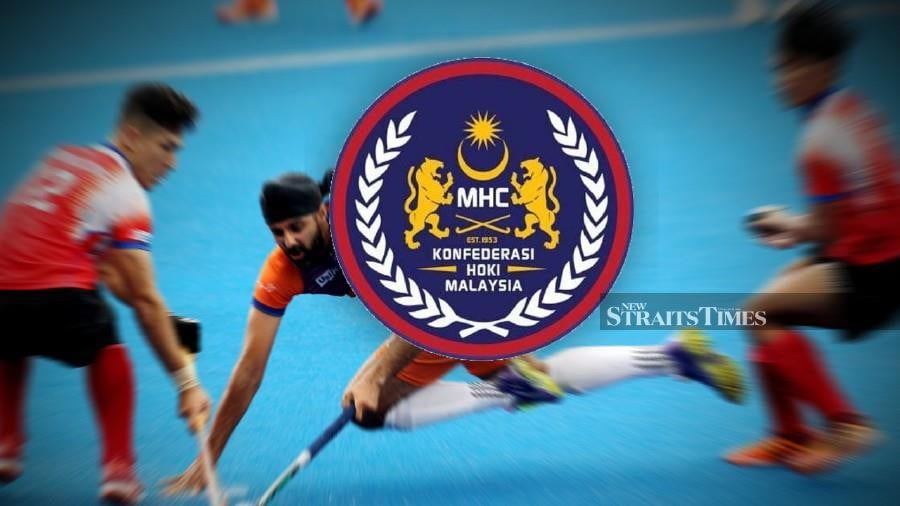
Covid-19 is challenging players and officials to abandon MHL yet again, but it looks like the virus is on the losing side this time around. - NSTP file pic
THE strict standard operating procedure (SOP) for the Malaysia Hockey League (MHL) will turn off many, but it is not going to deter teams from the field.
They do not mind undergoing hardship just to play hockey again.
Malaysian Hockey Confederation (MHC) competitions committee chairman Datuk Seri Anil Jit Singh revealed the SOP to the MHL teams for training, friendlies and matches in an online meeting yesterday. The MHL is likely to start in mid-March.
Covid-19 is challenging players and officials to abandon MHL yet again, but it looks like the virus is on the losing side this time around.
"The team managers were briefed about the SOP. There are many instructions and also a money-consuming process.
"We will now discuss with our officials and players to finalise our plan," said Universiti Kuala Lumpur (UniKL) coach Megat Azrafiq.
UniKL dominated proceedings with a treble (Charity Shield, MHL and TNB Cup) last year.
The teams must decide whether to adopt the home or camp-based training programme ahead of the MHL.
However, for both initiatives, players and officials must undergo Covid-19 swab tests regularly.
"There are also guidelines for training and friendly matches before the MHL.
"All these need to be planned out, and it will take some time before everything is in place.
"My team will likely start training after Feb 22," said Megat.
The men's MHL comprises eight teams while six clubs will play in the women's tournament.
The costly swab tests, to be done twice, will involve around 400 people each time it is done.
Venues used for training and matches will also have to be sanitised regularly.
But it looks like the clubs and the MHC are adamant in keeping Covid-19 out of the MHL and make it a success this time around.
New Straits Times
MHC's comprehensive Covid-19 battle plan
By Jugjet Singh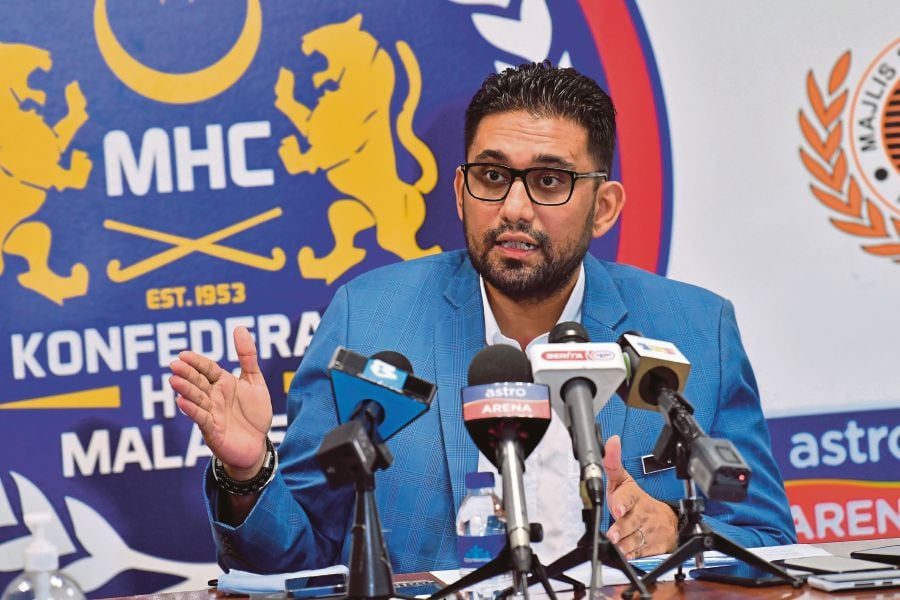
MHC competitions committee chairman Datuk Seri Anil Jeet Singh at the media briefing yesterday. -- Bernama
THE Malaysian Hockey Confederation's (MHC) press conference yesterday for the Malaysia Hockey League (MHL) was like a war briefing.
MHC competitions committee chairman Datuk Seri Anil Jeet Singh and his men have drawn up a comprehensive plan to battle the Covid-19 pandemic at the National Hockey Stadium in Bukit Jalil from March 11 to April 3.
The MHC also issued a stern warning to the MHL players and officials against breaking the quarantine-based approach standard operating procedures (SOPs) yesterday.
Anil stressed that those who breach the MHL bubble will be expelled from the league and their "bubble" base if they sneak out without permission.
Anil said around 600 players, team members and officials will be placed under the MHL bubble at a hotel or hostel to be confirmed soon.
The men's MHL starts on March 11 while the women's on March 15.
"A task force will be responsible to check on the teams and officials once they enter the bubble," said Anil yesterday.
"They're not allowed to go out. It is not easy for us to get permission and run the league amid the Covid-19 pandemic, so we hope everyone will adhere to the rules.
"We do not want any problems when the league starts.
"Those who sneak out of the bubble will be expelled. That will be the end of their campaign.
"However, an exemption will be looked into if there is an emergency. The task force will look into it."
He said every team member must clear the polymerase chain reaction (PCR) test three days before entering the bubble on March 10, while Rapid Test Kit Antigen (RTK) tests will be conducted by the MHC during the league.
He also confirmed that MHC would bear all costs for the bubble, including accommodation, food and transportation to the National Hockey Stadium, estimated around RM300,000.
"So far, all of the teams have agreed with the dates and the SOPs. We would like to thank the government for allowing the league and the MHC executive board for covering the additional expenses," he added.
The men's MHL comprises defending champions Universiti Kuala Lumpur, Terengganu Hockey Team, Tenaga, TNB Thunderbolts, Maybank, Universiti Teknologi Mara, Nurinsafi and Sabah.
PKS UniTen, Police Blue Warriors, Mutiara Impian, Sabah, Young Tigress and UniKL Ladies are the teams in the women's event.
New Straits Times
BK Subramani: Jawan, Kisaan and a Hockey hero for India
BK Subramani donned multiple roles with acclaim: famous field hockey player, decorated Army Officer, successful coach and now a farmer. The midfield maestro was a bundle of energy and his onfield dynamism was seen to be believed. He candidly shares shares many hitherto unknown childhood memories in yet another episode of the exciting MY STORY Series. — Editor
ERROL D’CRUZ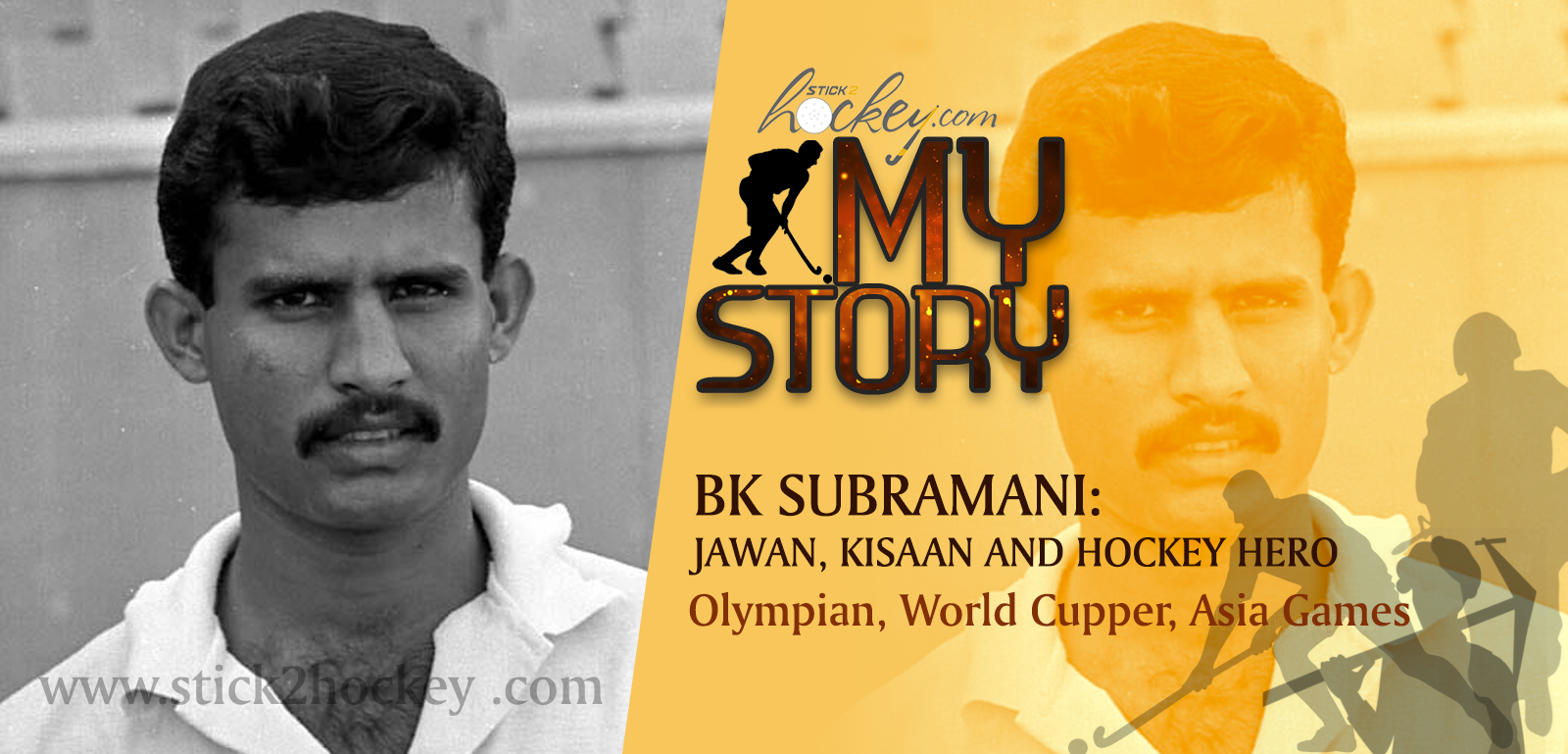
For the most part, BK Subramani wore apparel he cherished. Be it the sky blue of the Indian national team or the olive green of the army, he wore it with pride.
The 59-year-old retired from the armed forces last year and back home in Coorg (now Kodagu), the picturesque and exotic district in Karnataka, he reflects on careers that brought him great joy and satisfaction.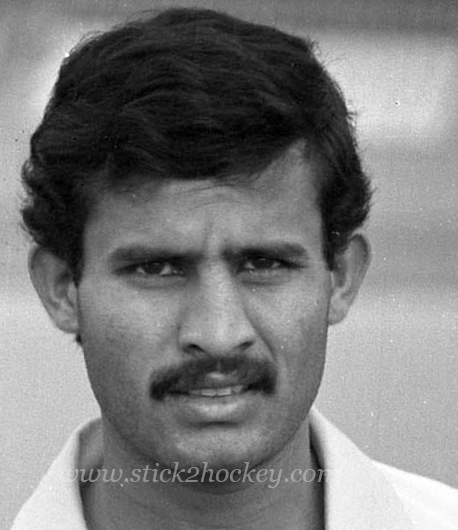
Energy was the byname of BK Subramani. Photo: Ashok Vahie
“I can’t recall any sorrow or disappointment that either hockey or the army brought me,” Subramani says. “Except perhaps in the days of my boyhood when my protective older brothers kept me from joining them to play hockey, fearing I would get hurt. I sat over the sidelines sad and frustrated,” he recalls. “Later on they relented and allowed me some five minutes of playing time towards the fag end of the matches. I used to wait so patiently for the last 10 minutes of play!”
Hockey came naturally to Subramani. “In Coorg you are either a soldier, coffee plantation worker or a hockey player,” he says with a chuckle. “Almost every family had a hockey player and mine was no different. His brothers Ramesh, Suresh and Uthaiah – all accomplished players — acknowledged BK Subramani’s talent and natural affinity for hockey.
“Most of all, it was my fitness that stood out and I could run up and down the pitch,” Subramani recalls. In later years, Subramani was picked up by scouts from Madras Engineering Group (MEG), Bangalore, an army unit but also famous for its exploits on the hockey pitch.
“I had no idea what MEG was at the time. I was just overjoyed at being selected to join a hockey team. I travelled to Bangalore (now Bengaluru) and joined the unit – it was the start of two careers, hockey and the army. My coach was the famed Olympian VJ Peter. He was appreciative of my talents and especially my fitness and advised that I play centre-half,” Subramani fondly recollects. “It was hockey and more hockey for me. And I travelled the length and breadth of the country playing tournament after tournament.”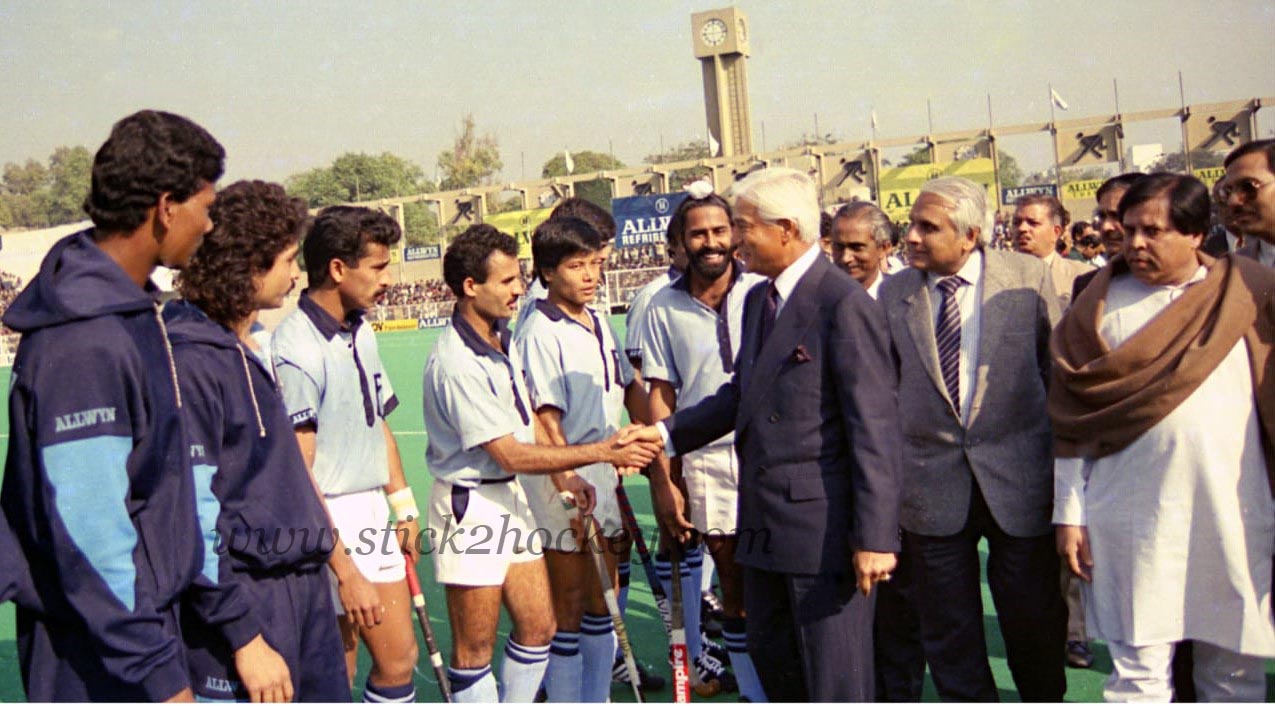
Olympian BK Subramani being graced by the late Sultan Azlan Shah, Asia Cup, New Delhi 1989. (l-r) Ajit Lakran, RP Singh, Jude Felix, BKSubramani, Thoiba Singh, Vivek Singh (hidden), captain Pargat Singh, Azlan Shah, RK Prasad (IHF President) & Rahman (IHF Vice-President). Photo: Ashok Vahie
In 1981, he was selected for the Junior World Cup qualifying tournament in Hong Kong before going on to play the 1982 Junior World Cup in Kuala Lumpur, Malaysia. “I was overjoyed,” Subramani flashes back. “It was a great moment for a boy from a remote place to be in the team of a country which had won eight Olympic gold medals. I can’t explain the feeling…”
Subramani went on to play for the senior India team in 1984, making his debut at a four-nation tournament in Amstelveen, The Netherlands. He eventually donned the country’s colours at the 1988 Seoul Olympics and the 1986 Willesden and 1990 Lahore World Cups.
But the busy campaign in domestic hockey continued unabated. During one season, Subramani lost his mother.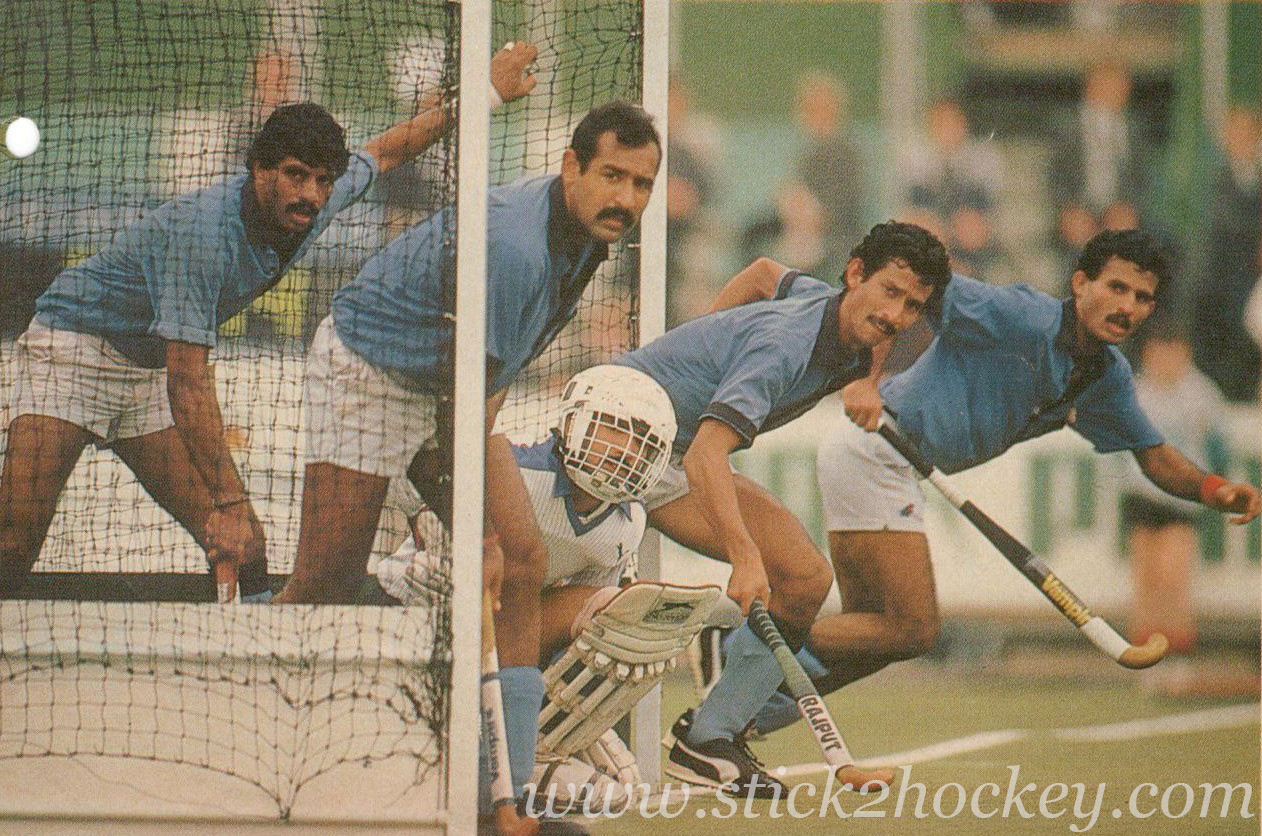
MM Somaya, Vineet Kumar, Joaquim Carvalho, RS Rawat & BK Subramani defending a penalty corner, 1986
“I returned from the Muruguppa Gold Cup in Chennai and was to catch a train to Patiala the next day. When I reached Coorg, I learned that my mother (Neelama) was in hospital for a heart ailment. She passed away seconds after she saw me. My family members said she held on just to see me… She was my source of support and encouragement like my father (Kalaiah).”
Subramani, you might say, beat the odds to go the distance in the sport. His brothers protective stance extended to every activity. Including a long-distance road race in Coorg which he was keen on participating in. “As a 12-year-old, I was forbidden to take part. My brothers thought I was too young to do so and I was, clad in school uniform, sitting at a bus stop, totally dejected. An acquaintance noticed me there and offered me a lift to the marathon start. He happened to be the chief guest who would flag off the race. I was thrilled. I disappeared in the crowd and took my place at the rear group of runners so as to escape being noticed by my brothers who were among the participants.
“At the 2 km-mark I was going strong and I overtook my oldest brother Ramesh. I kept going finally winning the race. My father was at the finish line at the College ground to watch me cross the finish and must have been shocked to do so! I stepped up to receive my prize – a handsome sum of Rs 21! I collected it and disappeared, fearing being scolded by my brothers for defying their orders and taking part in the race. But, far from that, they congratulated me later at home!”
Subramani put the twenty-one rupees to good use. But he needed it to be supplemented by his mother and father. “You see, I was longing to buy a new hockey stick with a towelled grip but the money I had was way too little for it. My father handed me Rs 50, my mother another Rs 40 and an uncle used his motorcycle to take us some 60km to the centre of Coorg to buy the stick.
“The trip also gave me the opportunity to witness an exhibition match between the triumphant 1975 World Cup winning India team and a local side. I was simply delighted at how things worked out. I picked up my stick and took it along with me to the stadium. Things didn’t end too happily however. Rain washed out the match and I didn’t get to watch many of the stars which included two, MP Ganesh and BP Govinda, from my hometown Coorg in action. But I didn’t stay sad for long. I brandished my stick with pride and joy. When I reached home at night I flashed it all over the place!”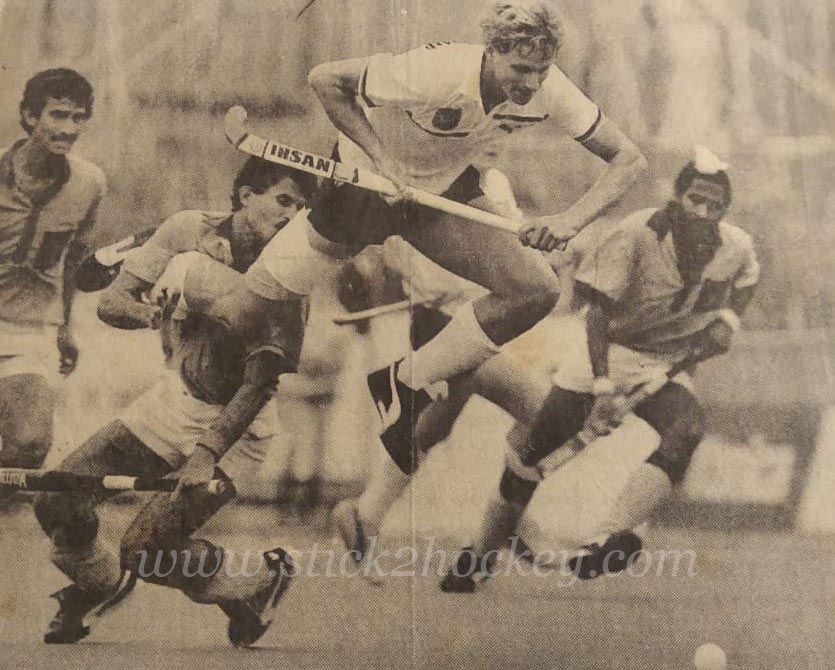
BK Subramani flanked by MM Somaya and Pargat Singh in the thick of nail baiting action
It was this raw enthusiasm and talent that held Subramani in good stead. His fitness was a key factor in his adjusting to artificial surfaces despite having little or no exposure to them. In time Subramani took his place among the seniors and he packed his stick – now made from fibreglass, not the mulberry shaft he so proudly purchased almost a decade ago.
“The coach at the tournament in Amstelveen was BP Govinda, from my hometown Coorg. Among the first things he showed me was the penalty stroke spot from which he failed to score in the 1973 World Cup final against hosts The Netherlands! I remember listening to it on All India Radio’s commentary. My entire family was near the radio listening to the commentary that went on nearly till midnight. I remember how sad we felt when India lost in the tie-breaker. We couldn’t recover from that defeat for a week…
“But I fondly remember the voice of famous commentator Jasdev Singh,” Subramani says. “His exciting commentary was one of the reasons that drew me to hockey.”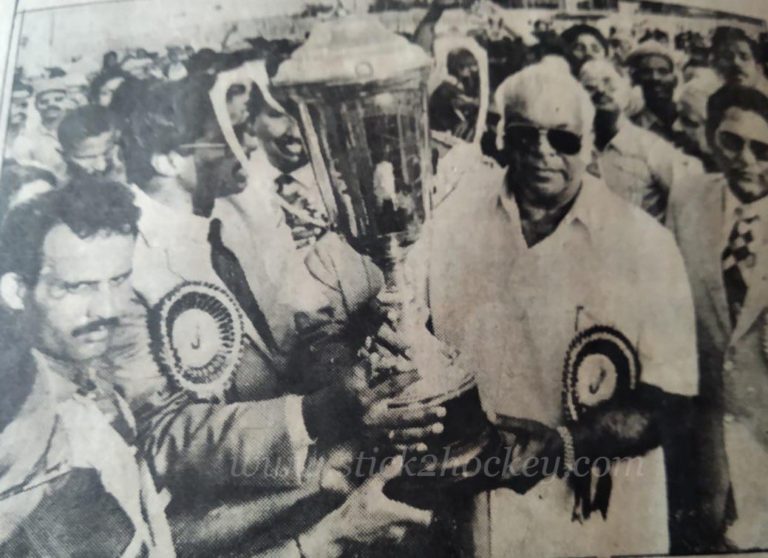
Services captain Subramani receiving the Madurai Nationals crown at the hands of the IHF President MAM Ramasamy,
Subramani represented Services at the Senior National Championship for a decade. They won the title twice, first at Palakaad 1985 and Madurai 1992, under his captaincy. But Subramani was then dropped from the India team. “I vanished from the international scene and took to coaching. I acquired an NIS diploma after which I coached the women’s junior national team for a year but after that I focused on my army career,” he explains.
Subramani eventually rose to the rank of Lieutenant-Colonel, served in Jammu and Kashmir and joined the famed Maratha Light Infantry in Belgaum the unit which was served by hockey legends Shankar Laxman, Bandu Patil and Shantaram Jadhav.
But in the main, it was the army and its many assignments for Subramani after he hung up stick. “I’ve enjoyed every challenge in the Olive Green as well,” he says. “After retiring last year, I can now get back to sport and in doing so wish to give something back. I have involved myself in coaching government school kids in several sports, not just hockey,” Subramani reveals.
“There’s a lot of talent around but these children get little opportunity to play and I want to change that. I helped organize six-a-side football, athletics and kho-kho for school children last year but I want to take that further.”
Subramani and his wife Anju have a son Ronith Pemaiah who is studying law in Pune. Retired he may be but endeavours to remain active. “I exercise regularly and I am a keen golfer,” Subramani reveals. “And to keep busy, I have got involved in the coffee plantation business. You could say that after ‘Jai Jawan’, I’ve moved to ‘Jai Kisaan’,” the ever-cheerful Coorgi declares.
But, one wagers, that between the sickle and the rifle there’s always been the hockey stick and the role he played in the sky-blue India shirt that Subramani cherishes most of all.
Stick2Hockey.com
So much more than a game in Kampala
Innocent Mbabli is Head Coach at the Hope Hockey Skills Foundation (HHSF) in Uganda. Where much of the international hockey community has been forced into a temporary postponement of activities, participants on the Hope Hockey Skills Foundation have been able to access training and education over the past few months.
For the children who attend the camps and training sessions, this is about far more than purely learning how to play hockey. Through interactive and fun sessions, the coaches and volunteers also teach the children fundamental life skills, such as cooking, making clothing and healthy eating, as well as educating them on social skills such as good communication skills, sexual health and drug avoidance.
As Innocent says: “By interacting with the kids on a regular basis and talking to them about life choices, that is a way of making them stronger and more resilient to life’s challenges.”
The HHSF has also been active in sharing out food parcels with families in Kampala who have been affected by the pandemic. For the past few months, the coaches and volunteers from the programme have been visiting the homes of many of the participants to check on their health and living conditions.
More than 200 children aged 3-18 take part in the HHSF programmes of activity. The camps and training sessions are held in the lower income areas of Kampala, such as Naguru. This is also where most of the nine coaches and four volunteers come from, so there is a real understanding of the challenges faced by the children and their families.
Innocent uses two examples to illustrate the work of the HHSF.
“Shafic is boy who joined us in 2015. He was a boy selling eats [Maize], which he used to sell on the street while moving around every evening. He comes from a humble family. Both he and his younger sister and brother play hockey too.”
Innocent persuaded Shafic to join in the hockey sessions after he invited the lad to sell Maize to the other hockey participants and their families. This created a ready market, but more importantly, introduced Shafic to a sociable and healthy lifestyle. He became a popular member of the group and soon found his way back into education. He completed his primary school education and has won a scholarship to the best field hockey playing school in Uganda, Kakungulu Memorial Secondary School. He also helps out as a junior coach on the programme.
Innocent says Shafic has become one of the best young players in Uganda.
The other example is Batusa Colline. Innocent explains that Batusa started playing hockey in 2012. He joined the HHSF in 2014 and is now both a player and a coach. Through his coaching experience on the camps and his work as a volunteer and coach at subsequent Hockey5s tournaments, he was offered a full scholarship at Kakungulu Memorial Secondary School.
He became school captain, then joined a top club side – Wanainchi Sports Club – and has now graduated to the Under 19 national team. Soon he will be travelling overseas to play professional hockey in Italy for Hockey Club Pistoia. As Innocent says: “This is a case of a player grabbing opportunities and living his dream.”
For the future, the Foundation is looking for more sponsorship so it can develop camps in different areas of Kampala. Aside from the hockey coaching, the Foundation is also supporting the creation of businesses, such as a bakery or craft shop. The idea is to create opportunities for the hockey players to develop careers, as well as healthy lifestyles.
FIH site
Rest In Peace Vivienne Clarke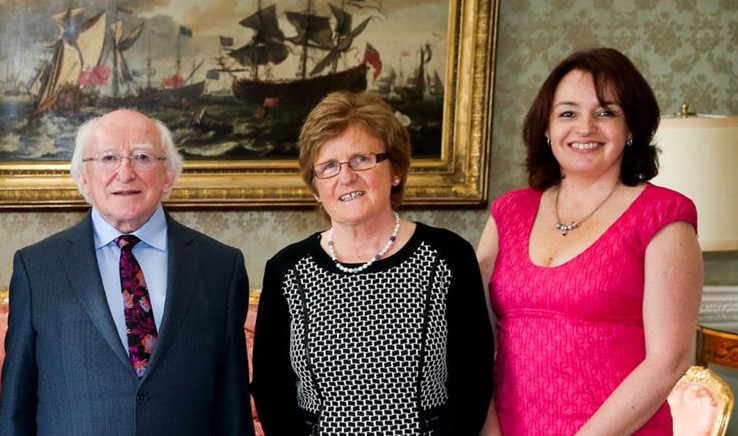
It is with great regret that we announce the passing of our dear friend and colleague Vivienne Clarke. An extraordinary individual, Viv has been a central figure within Hockey Ireland for more than a decade and we will always remember her fondly. Her strength, optimism, hard work and brilliant sense of humour were a privilege to share over the years.
A beacon of knowledge and a delightful presence within the Hockey community, Viv’s passing is a great loss to the sport as a whole. We know she will be deeply missed by everyone within the hockey community.
Our hearts go out to Viv’s family and friends at this difficult time. May she rest in peace. 
Pictured above, Vivienne Clarke far right of image in attendance at Áras an Uachtaráin for International Women’s Day with President Michael D Higgins and his wife Sabina with other members of Hockey Ireland staff.
Irish Hockey Association media release